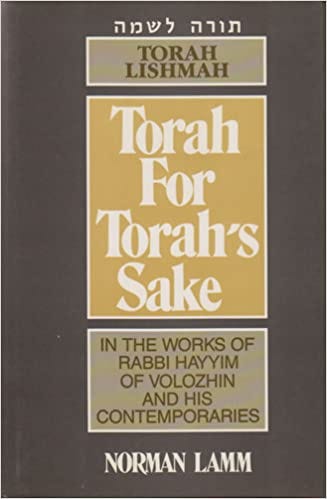Torah Lishma, Aveira Lishma

In yesterday's post, I discussed how while there was always Torah study that was not oriented towards any practical knowledge of halachah, it is nevertheless the case that classically, the primary function of Torah study was always expressed in terms of practical knowledge of halachah.
This was challenged by a number of people. Several of them thought that I was saying that there was never any non-halachic Torah study, or that there was no value to such study. I didn't make either of those claims.
Others claimed that the notion of Torah lishmah proves that the primary goal of studying Torah is for the sake of knowing Torah. As someone called "Lazar" quoted:
Pirkey Avot 6: Rabbi Meir said: Whoever occupies himself with the Torah for its own sake, merits many things; not only that but he is worth the whole world.
But that's not the correct translation!
Torah lishmah does not mean "Torah for its own sake." In fact, yesterday someone presented a fabulous proof for that. The concept of עבירה לשמה does not refer to a transgression committed "for its own sake." Rather, it refers to a transgression committed leshem Shamayim. By the same token, learning Torah lishmah means learning Torah leshem Shamayim.
The definitive work on this topic is Rabbi Dr. Norman Lamm's comprehensive Torah Lishmah - Torah for Torah's Sake: In the Works of Rabbi Hayyim of Volozhin and His Contemporaries. There one sees that the classical definition of Torah Lishmah, amongst Chazal and the Rishonim, was functional: that it referred to learning Torah in order to understand and perform the mitzvos correctly. To quote from the Gemara:
"The goal of wisdom is repentance and good deeds, so that a man should not study Torah and Mishnah and then rebel against his father and mother and teacher and his superior in wisdom and rank, as it says, 'The fear of the Lord is the beginning of wisdom, a good understanding is gained by all those that do them.' It does not say, 'for all who study,' but 'for all who do,' which implies, those that do them lishmah and not shelo lishmah." (Berachos 17a, Munich MS)
And from a later source:
If a man wishes to study lishmah, what shall he intend when he studies? "Whatever I study I will practice." (Sefer Chassidim 944)

The notion that Torah Lishmah refers to "study purely for the mitzvah of Talmud Torah and nothing else" was the innovation of Rav Chaim of Volozhin, which itself was a reaction to the chassidic transfer of the focus of religious life towards spirituality. Rav Chaim's proposed source for his novel definition of Torah lishmah was a rather questionable inference from a certain statement of the Rosh, in turn based on a Talmudic passage which R. Lamm demonstrates to be an errant textual version (see note 20 on pp. 247-8, pictured at right).
To quote R. Lamm: "In conclusion, then, R. Hayyim's reaction to the disturbance in the study-practice (and study-prayer) equilibrium by the hasidic initiative was to endow study with a value much greater than was attributed to it before." A fundamental component of this was to give a new definition of Torah lishmah. But that is not what the phrase traditionally meant.


